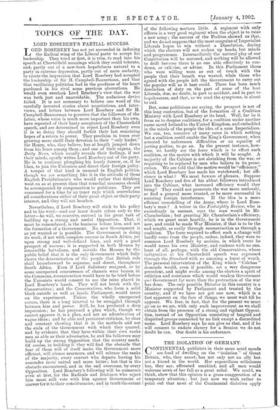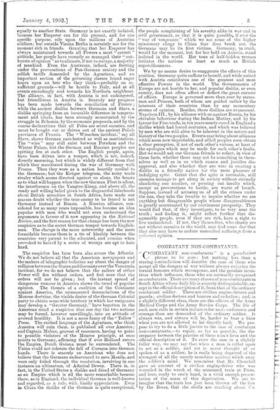THE ISOLATION OF GERMANY.
CONTINENTAL publicists in their more acrid moods are fond of dwelling on the " isolation " of Great Britain, who, they assert, has not only not an ally but not a friend in the world. Her supercilious selfishness has, they say, affronted mankind, and all men would welcome news of her fall as a great relief. We could, we think, show that this opinion is a gross exaggeration of- a temporary situation ; but just now we wish rather to point out that most of the Continental diatribes apply equally to another State. Germany is not exactly isolated, because her Emperor can for the present, and for one specific purpose, rely upon the millions of Austrian soldiers; but outside Vienna Berlin is certainly not for the moment rich in friends. Granting that her Emperor has always maintained towards all Powers a most " correct " attitude, her people have recently so managed their " out- bursts of opinion " as to alienate, if not to enrage, a majority of mankind. Even the Austrians, indeed, are fretting under the provocations of Pin-German oratory and the selfish tariffs demanded by the Agrarians, and an important section of the governing classes found eager hopes upon an heir who they think—probably on in- sufficient grounds—will be hostile to Italy, and at all events exceedingly cool towards his Northern neighbour. The alliance, in fact, with Austria is not endangered, but friendliness in Austria is. Scarcely any progress has been made towards the conciliation of France ; while the ancient dislike between Germans and Slays, a dislike springing from an incurable difference in tempera- ment and ideals, has been strongly accentuated by the struggle in Bohemia, by the economic proposals, and by the coarse declarations that all Poles are secret enemies, and must be-bought out or driven out of the ancient Polish provinces of Prussia. The " Wreschen incident," say all Slays, shows German race-hatred as well as martinetism. The " wire " may still exist between Potsdam and the Winter Palace, but the German and Russian peoples are spitting fire at each other. The English people, again, have been driven into a temper, which is not, indeed, directly menacing, but which is widely different from that which they manifested during the war of Germany with France. Then they were as a nation heartily cordial to the Germans ; but the Kruger telegram, the noisy trade rivalry which seems directed against us alone, the boasts as to what will happen when the new German Fleet is afloat, the interference on the Yangtse-Kiang, and above all, the ready and willing belief given to the disgraceful falsehoods about British atrocities in South Africa, have made our masses doubt whether the true enemy to be feared is not Germany instead of Russia. A Russian alliance, con- sidered for so many years impossible, has become an idea popular with men who would not even understand the arguments in favour of it now appearing in the National Review, and the first reason for that change has been the new suspicion as to the secret German temper towards English- men. The change is the more noteworthy and the more formidable because there is a tie of kinship between the countries very patent to the educated, and cousins when provoked to hatred by a series of wrongs are apt to hate hard.
The suspicion has been born also across the Atlantic. We do not believe all that the American newspapers and the makers of telegraphic bulletins say about the danger of collision between the States and Germany over the Venezuela incident, for we do not believe that the sailors of either Power will fire without orders, and feel sure that the orders will not be given ; but the instant spread of dangerous rumour in America shows the trend of popular opinion. The threats of a coalition of the Continent against America, the unmeasured denunciations of the Monroe doctrine, the visible desire of the German Colonial party to obtain some wide territory in which her emigrants may develop a " Greater Germany," have begotten in the American mind a suspicion that one day the two nations may be forced, however unwillingly, into an attitude of avowed hostility. It is not a mere fancy of the " Yellow " Press. The excited language of the Agrarians, who think America will ruin them, is published all over America ; and Captain Mahan, gravest of reasoners, having to point to possible violators of the Monroe principle, at once points to Germany, affirming that if ever Holland enters the Empire, Dutch Guiana must be surrendered. The Union could net tolerate the fall of Curacoa into German hands. There is scarcely an American who does not believe that the Germans endeavoured to .save. Manila, and were only foiled through the resolution, involving in one instance an ultimatum, of Admiral Dewey. There is, in fact, in the United States a dislike and dread of Germany as an Empire which is all the more remarkable because there, as in England, the individual German is well-known and regarded, as a ride, with kindly appreciation. Even in China the dislike of the German is quite exceptional, the people complaining of his severity alike in war and in civil government, so that it is quite possible, if ever the " war of vengeance " which we see some of the higher missionary clergy in China fear does break out, the Germans may be its first victims. Germany, in truth, would for the moment, but for her hold on Austria, stand isolated in the world. Her tone of half-hidden menace irritates the nations at least as much as British superciliousness.
We by no means desire to exaggerate the effects of this position. Germany quite suffices to herself, and while united with Austria constitutes one of the greatest and most effective Powers in the world. The Governments of Europe are not hostile to her, and popular dislike, or even enmity, does not often affect or deflect the great current of affairs. Europe is governed more than ever by states- men and Princes, both of whom are guided rather by the interests of their countries than by any momentary storms of opinion. Besides, those dislikes are evanescent. Napoleon III., by his alliance with us against Russia, by his chivalric behaviour during the Indian Mutiny, and by his favour for Free-trade, in ten years nearly cured in England a dislike which had lasted centuries, and which was believed by men who are still alive to be inherent in the nature and history of the two peoples. Events may bring about alliances which seem now improbable, and allied peoples soon obtain a clear perception, if not of each other's virtues, at least of the apologies which may be made for each other's faults. But we would ask our German friends to reflect, in view of these facts, whether there may not be something in them- selves as well as in us which causes and justifies dis- approval, and also whether they are wise in creating a dislike in a friendly nation for the mere pleasure of indulging spite. Grant that the spite is excusable, still enemies manage to get along in society without eternally slandering one another, or pouring out insults which, except as provocations to battle, are waste of breath. Suppose, instead of accusing us of all the crimes under the sun, they take the trouble to inquire whether we are anything but disagreeable people whose disagreeableness is greatly accentuated by our continuous prosperity. They would find that, if they investigate, to be very near the truth ; and finding it, might reflect further that agreeable people, even if they are rich, have a right to live unslandered. If not, they themselves, who clearly are not without enemies in the world, may find some day that they also may have to endure unmerited sufferings from a poisoned opinion.







































 Previous page
Previous page